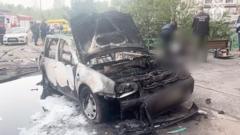The Russian Investigative Committee has announced the arrest of a suspect accused of carrying out a car bomb attack that killed General Yaroslav Moskalik, blaming Ukrainian operatives for the incident. This development marks another chapter in the ongoing conflict between Ukraine and Russia amid rising allegations of terrorism.
Arrest Made in Car Bombing of Russian General: Accusations Fly Between Ukraine and Russia

Arrest Made in Car Bombing of Russian General: Accusations Fly Between Ukraine and Russia
Russian authorities have detained a suspect alleged to be a Ukrainian agent responsible for the car bomb attack that killed a senior general in Moscow, escalating tensions between the two nations.
In a recent incident in Moscow's suburbs, Russian security forces detained a suspect identified as Ukrainian spy Ignat Kuzi, who is accused of planting explosives that killed General Yaroslav Moskalik. The general, who served as the deputy head of the main operational directorate of Russia's military General Staff, lost his life when a homemade bomb, rigged in a Volkswagen Golf, detonated as he passed the vehicle outside his home in Balashikha.
The Federal Security Service (FSB) states that the operation behind the attack was coordinated remotely from Ukraine, with the alleged assailant having been recruited by Ukrainian intelligence in 2023 before traveling to Moscow in September. Supporting their claims, Russian media has broadcast a video of Kuzi purportedly confessing to his role, along with footage documenting his arrest and components of the bomb.
This incident follows Russia's long-standing accusations of Ukrainian involvement in various terrorist acts on its soil, with the Kremlin asserting that Kyiv is actively engaging in terrorism against Russia. The timing of the attack is especially poignant given General Moskalik's past role in negotiations with Ukraine in 2015, aimed at resolving the ongoing conflict in the Donbas region.
Ukraine has yet to respond publicly to the allegations surrounding the bombing, a notable silence amid the backdrop of escalating tensions following the full-scale invasion of Ukraine by Russian forces in February 2022. The geopolitical implications of this incident are significant, potentially further straining relations as both countries navigate a complex and rapidly evolving conflict landscape.
The Federal Security Service (FSB) states that the operation behind the attack was coordinated remotely from Ukraine, with the alleged assailant having been recruited by Ukrainian intelligence in 2023 before traveling to Moscow in September. Supporting their claims, Russian media has broadcast a video of Kuzi purportedly confessing to his role, along with footage documenting his arrest and components of the bomb.
This incident follows Russia's long-standing accusations of Ukrainian involvement in various terrorist acts on its soil, with the Kremlin asserting that Kyiv is actively engaging in terrorism against Russia. The timing of the attack is especially poignant given General Moskalik's past role in negotiations with Ukraine in 2015, aimed at resolving the ongoing conflict in the Donbas region.
Ukraine has yet to respond publicly to the allegations surrounding the bombing, a notable silence amid the backdrop of escalating tensions following the full-scale invasion of Ukraine by Russian forces in February 2022. The geopolitical implications of this incident are significant, potentially further straining relations as both countries navigate a complex and rapidly evolving conflict landscape.




















